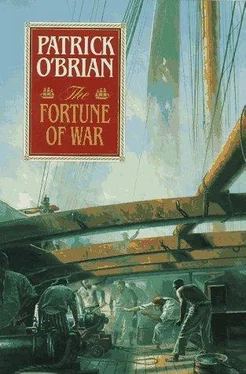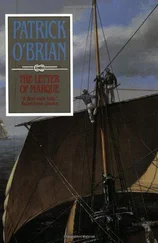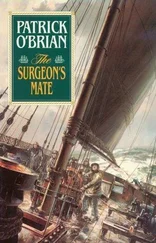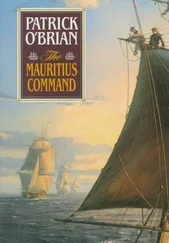Patrick O'Brian - The fortune of war
Здесь есть возможность читать онлайн «Patrick O'Brian - The fortune of war» весь текст электронной книги совершенно бесплатно (целиком полную версию без сокращений). В некоторых случаях можно слушать аудио, скачать через торрент в формате fb2 и присутствует краткое содержание. Жанр: Книги. Описание произведения, (предисловие) а так же отзывы посетителей доступны на портале библиотеки ЛибКат.
- Название:The fortune of war
- Автор:
- Жанр:
- Год:неизвестен
- ISBN:нет данных
- Рейтинг книги:3 / 5. Голосов: 1
-
Избранное:Добавить в избранное
- Отзывы:
-
Ваша оценка:
- 60
- 1
- 2
- 3
- 4
- 5
The fortune of war: краткое содержание, описание и аннотация
Предлагаем к чтению аннотацию, описание, краткое содержание или предисловие (зависит от того, что написал сам автор книги «The fortune of war»). Если вы не нашли необходимую информацию о книге — напишите в комментариях, мы постараемся отыскать её.
The fortune of war — читать онлайн бесплатно полную книгу (весь текст) целиком
Ниже представлен текст книги, разбитый по страницам. Система сохранения места последней прочитанной страницы, позволяет с удобством читать онлайн бесплатно книгу «The fortune of war», без необходимости каждый раз заново искать на чём Вы остановились. Поставьте закладку, и сможете в любой момент перейти на страницу, на которой закончили чтение.
Интервал:
Закладка:
From this point on the tone rose higher and still higher. Stephen heard them hard at it when he was on the stairs and when he opened the door the volume of sound was very great indeed. They fell silent as he paced across the room and took Jack's pulse: then, 'You must leave at once, sir,' he said to Brenton. 'That is doctor's orders.' But Brenton had been called a miserable scrub-faced swab of a civilian and many other things; he had been compelled by sheer moral force to sit silent for minutes on end while Captain Aubrey listened for the guns; he had been humiliated in the presence of his secretary and the useless bailiff's man; and breathing hard he cried that he would not move a step until he had that document, pointing to the Admiral's letter in Jack's hand. Then he let fly a series of passionate and sometimes coherent remarks about his importance in the Department, the Department's unlimited authority over prisoners, and his powers of coercion.
'Leave the room, sir,' said Stephen. 'You are doing the patient serious harm.'
'I shall not,' said Brenton, stamping.
Stephen pulled the bell and desired Bridey to tell the porter to step up: a moment later, without a sound, the immense Indian appeared in the door, filling it entirely. 'Be so good as to show these gentlemen out,' said Stephen.
The Indian's cold eye, quite expressionless, moved over them; they were already standing, and now they walked out. But Brenton turned on the threshold and shaking his fist at Jack he cried out, 'You have not heard the last of me.'
'Oh go to the devil, you silly little man,' said Jack, wearily; and then, when the door had closed, 'Officials are much the same all over the world. That reptile might have come straight from the Navy Office to badger me about dockets I had forgotten to countersign in the year one. But I tell you what, Stephen, President and Congress have slipped out on the ebb, and I am very much afraid they have got clean away.'
'I really cannot have you worried like this,' said Stephen, to whom the sailing of the frigates was, at this moment, a matter of complete indifference. He was also very much afraid that in common civility Jack would ask after Diana, and in his present state of mind or rather of confusion he did not wish to speak of her. 'I shall go and have a word with Dr Choate,' he said.
He walked slowly down the stairs and stepped into the porter's booth to thank the Indian for his services. The Indian listened with something like approval on his face. 'It was a pleasure to me,' he said, when Stephen had finished. 'They were government officials, and I hate government officials.'
'All government officials?'
'All American government officials.'
'You astonish me.'
'You would not be astonished if you were a native of this country, an aboriginal native. Here is a letter for you; it came after you had gone this morning.' Stephen saw that the direction was in Diana's bold dashing hand and he put the note into his pocket; if he could as easily have put it out of his mind he would have been relieved, for although he knew very well that presently he should have to clarify his thoughts and resolve a number of conflicts and apparent contradictions, he did long for a period of calm before doing so. Fortunately the Indian seemed to be in a mood for conversation: he asked, 'Why do you say Ugh to me?'
'I looked upon it as a usual greeting in the language of your nation - the Huron is represented as saying Ugh to the paleface in many authors, French and English. But if I am mistaken, sir, I ask your pardon: my intent was civil, though perhaps inept.'
'Most of the Hurons I know have every reason to say Ugh to the paleface, French, English or American: in the language that I speak - and I must tell you, sir, that there is an infinity of languages spoken by the original possessors of this continent - Ugh is an expression of disgust, repulsion, dislike. I had thought of resenting it, but it appeared to me that you meant no offence; and then I have a certain fellow-feeling for you; we are, after all, both defeated, both victims of the Americans.'
'Dr Choate has told me something of the unhappy Indian wars. He, at least, is very much opposed to them.'
'Dr Choate, yes: there are some good Americans, I admit. My grandfathers, who were at Harvard, at the Indian College, spoke of a Mr Adams as an excellent man. His mother, however, was a Shawnee - of the same nation, I may add, as the chief Tecumseh who is at present helping your people on the Canadian border. Here is Dr Choate.'
'Have you seen Dr Maturin?' asked Choate. 'I am looking for him.'
'And I was looking for you, colleague,' said Stephen from the darkness of the booth.
'I have an urgent cystotomy,' said Choate, 'and as we were speaking of it at our Sunday supper, I am come to beg for your assistance.'
'I shall be delighted,' said Stephen, and in fact nothing could have been more timely: an exceedingly delicate operation, but one that he had often carried out - the intense concentration of mind and hand, the moral preoccupation with the bound patient, only too conscious of the knife - these would entirely absorb his spirit, giving it that inner tranquillity where it could work without being thrust and pulled by his reason and his wishes. Yet there was also the night, the unoccupied night, to be considered, and after he had spoken to Dr Choate abut the necessity for keeping the Navy Department away from Jack Aubrey, he asked him for a pint of laudanum.
'The laudanum by all means,' said Choate, 'you will find it by the hogshead in the dispensary. As to the Navy Department, I shall do what I can, but these officials have very extensive powers in war-time. I have had notes from them, sharp, peremptory and authoritative, not to say hectoring.'
The operation, performed on an immensely obese, timid patient, was far more intricate than they had expected; yet finally it was done, and not only was it successful in itself, but there was a real likelihood that the man might live.
Stephen went to Jack's room to wash his hands, and found him asleep, lying on his back with his injured arm across his chest, and still with that set look of physical suffering and moral shock, not unlike the fainting, earth-coloured patient who had so recently been wheeled away. Stephen knew that nothing but a change of wind would wake him, and having washed he took the whisky-bottle from its hiding-place and drank off half a glass, neat and fierce. No alcohol was allowed in the Asciepia, but the Constitution's officers, particularly Mr Evans, were aware of this, and the space behind Captain Aubrey's books was filled with rye whisky, bourbon, and a thin, intensely acrid native wine.
He put the whisky back, dropped the glass - no change in that stern sleeping face - and withdrew, carrying his own laudanum bottle, green and labelled Poison. He had a small room on the inner courtyard, and here he found his lamp already lit and a fire glowing in the hearth: a greenshaded lamp that shone on his table and the papers spread over it, leaving the rest of the room in deep shadow. It was comfortable, the very picture of comfort; and he felt cold, desolate, extraordinarily lonely. Groping in his pocket he found Diana's note, tossed it on to the table, set his green bottle by it, threw his coat on the bed, and sat down, his chair turned half to the table and half to the fire.
For many, many years he had been unable to open his mind fully to any man or woman at all, and at times it seemed to him that candour was as essential as food or affection: during most of this period he had used his diary as a kind of surrogate for the non-existent loving ear - a very poor surrogate indeed, but one that had become so habitual as to be almost necessary. He missed it now, the close-written coded book, and having stared at the fire for a while he turned full to the table. His indifferent eye fell on the note, addressed in that familiar hand, and he drew a sheet of paper towards him.
Читать дальшеИнтервал:
Закладка:
Похожие книги на «The fortune of war»
Представляем Вашему вниманию похожие книги на «The fortune of war» списком для выбора. Мы отобрали схожую по названию и смыслу литературу в надежде предоставить читателям больше вариантов отыскать новые, интересные, ещё непрочитанные произведения.
Обсуждение, отзывы о книге «The fortune of war» и просто собственные мнения читателей. Оставьте ваши комментарии, напишите, что Вы думаете о произведении, его смысле или главных героях. Укажите что конкретно понравилось, а что нет, и почему Вы так считаете.












